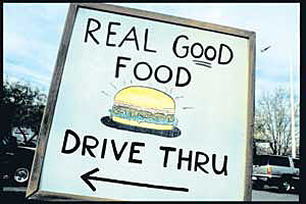 I would buy a permanent marker and fix this error.
I would buy a permanent marker and fix this error. It is not OK to use these words interchangeably.
A good idea is to take a really quick look at the real difference between adjectives and adverbs.
Adjectives: An adjective describes a noun. (people, places, or things) Adjectives give a little different meaning to a noun. Adjectives usually come before the noun they describe.
Example: Alexandre, who is 5 years old, owns a fake car. His father owns a real car.
However, adjectives can also come after a linking verb, which is a non-action verb. Examples of linking verbs are: the verb BE, look, seem, and smell.
Example: Alexandre’s car is fake. His father’s car is real.
We cannot replace real for really in these sentences. The reason is that an adverb cannot describe a noun.
Adverbs: An adverb can modify a verb, adjective, or another adverb. It cannot modify a noun. Adverbs are often formed by adding –ly to an adjective. There are different kinds of adverbs.
Adverbs of manner give more information about action verbs. It often answers the question ‘how?”
Example: How did he drive the car? He drove the car quickly.
Adverbs of frequency describe how often something happens. They usually appear before the main verb. However, adverbs appear after the use of the verb BE.
Example: How often does he drive the car? He rarely drives the car.
We also use adverbs when describing or giving more information about adjectives or other adverbs. These adverbs usually appear immediately before the adjective or adverb they describe.
Example: His car is really fast. The word fast in this sentence is an adjective. Really, an adverb, describes HOW fast.
It is not grammatically correct to say “Mexican food tastes real good”. 'Good' is an adjective. As such, the adjective ‘real’ cannot be used to modify it. 'Good' needs an adverb, and in this case, the adverb is ‘really’. The correct way to express yourself would be to say “Mexican food tastes really good”. If you want, add an exclamation point to that!
I know I did not cover everything. To learn more about the differences between adjectives and adverbs, visit Grammar Book.
For more exercises to test your knowledge, check out my post on Real vs. Really - Exercises.
 RSS Feed
RSS Feed